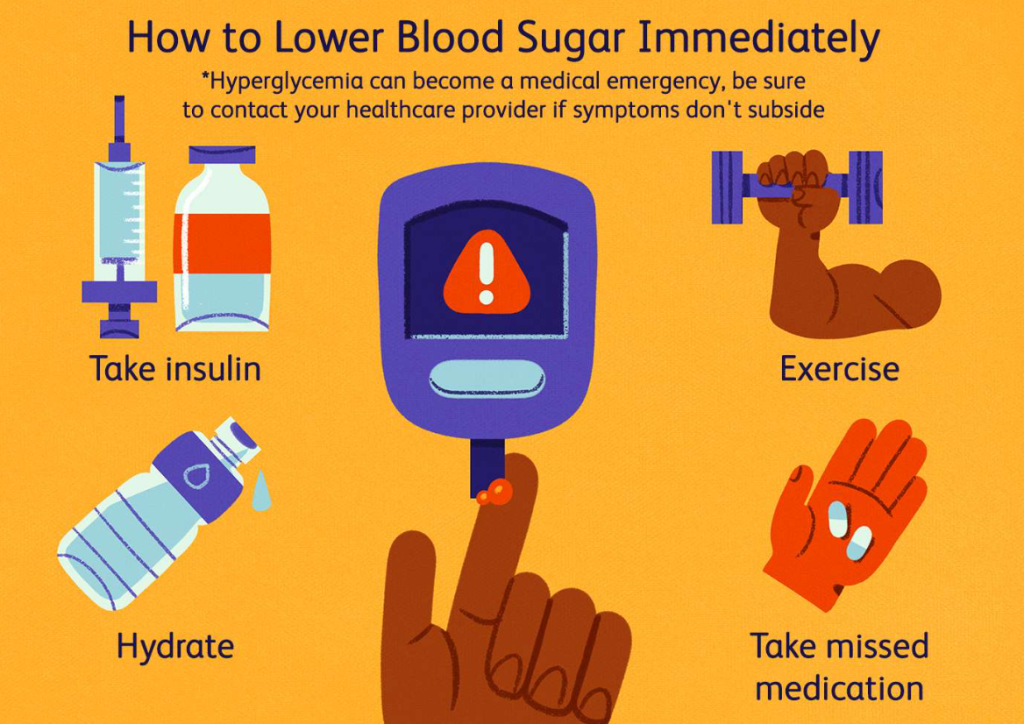
Why my sugar level is not decreasing even I stopped sugar and fat food?
There are a few reasons why your sugar level might not be decreasing even though you have stopped eating sugar and fat food.
- You may not be eating enough carbohydrates. Carbohydrates are the body’s main source of energy. When you don’t eat enough carbohydrates, your body may start to break down fat for energy. This can lead to a buildup of ketones in the blood, which can cause your blood sugar levels to rise.
- You may have insulin resistance. Insulin resistance is a condition where cells in the body do not respond properly to insulin. This can lead to high blood sugar levels.
- You may have an underlying medical condition. There are some medical conditions that can cause high blood sugar levels, such as Cushing’s syndrome or polycystic ovary syndrome (PCOS).
- You may not be taking your medication properly. If you are taking medication for diabetes, it is important to take it as prescribed by your doctor. If you are not taking your medication properly, your blood sugar levels may not be controlled.
- You are not exercising enough. Exercise helps to lower blood sugar levels by increasing the amount of glucose that is used for energy. If you are not exercising enough, this could be why your blood sugar levels are not decreasing.
- You are drinking too much alcohol. Alcohol can raise blood sugar levels. If you are drinking alcohol regularly, this could be why your blood sugar levels are not decreasing.
- You are taking certain medications. Some medications, such as steroids, can raise blood sugar levels. If you are taking any medications, it is important to talk to your doctor about how they might affect your blood sugar levels.
- Carbohydrate Intake: While you’ve stopped consuming sugar and fatty foods, your carbohydrate intake could still be affecting your blood sugar levels. Carbohydrates, including those from foods like grains, fruits, and starchy vegetables, can also impact blood sugar.
- Portion Sizes: Even if you’re avoiding sugary and fatty foods, consuming large portions of other foods can still contribute to elevated blood sugar levels.
- Hidden Sugars: Some foods that might not seem sugary can contain hidden sugars, such as certain sauces, dressings, and processed foods. These hidden sugars can still affect blood sugar levels.
- Underlying Medical Conditions: Conditions like insulin resistance, prediabetes, or diabetes can affect how your body processes glucose, leading to higher blood sugar levels.
- Lack of Physical Activity: Regular physical activity helps your body use glucose more effectively. If you’re not engaging in physical activity, it might impact your blood sugar levels.
- Stress: Chronic stress can lead to higher blood sugar levels. Stress hormones can affect how your body responds to insulin.
- Medications: Certain medications, even non-diabetes-related ones, can affect blood sugar levels. If you’re on any medications, they might be contributing to your levels.
- Other Dietary Factors: While you’ve cut out sugar and fat, other dietary factors, such as protein intake, fiber consumption, and overall balance of nutrients, can influence blood sugar levels.
- Glycemic Index: Some foods have a higher glycemic index, which means they cause rapid spikes in blood sugar levels. Even if they’re not sugary or fatty, these foods can impact your levels.
- Medical History: Your personal medical history, genetics, and metabolism can play a role in how your body manages blood sugar levels.

